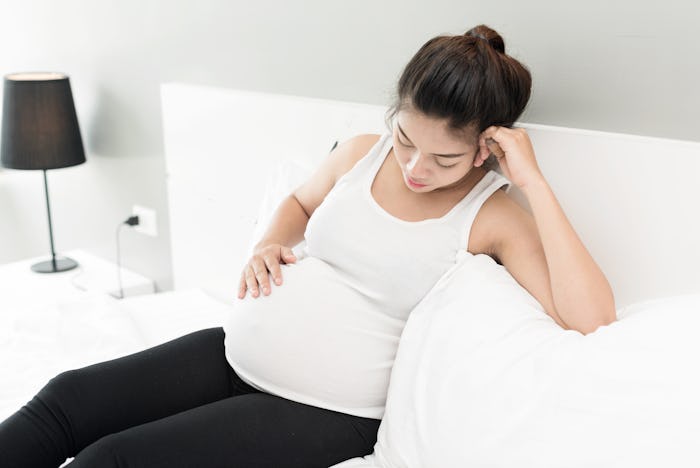Life

5 Common Illnesses That Have Even Weirder Symptoms During Pregnancy
You’re growing extra body hair, your voice is getting deeper, and you’re bloated absolutely everywhere — getting pregnant means lots of new things will happen to your body. As if being pregnant didn’t cause enough odd bodily changes, sometimes pregnancy causes weird symptoms when sick. While some of them aren’t a big deal, others are a bit higher risk (looking at you, flu).
Tiffany Wells, MD, OB-GYN at Baptist Health in Jacksonville, Florida, tells Romper that chronic conditions can change unexpectedly during pregnancy, and some common illnesses can cause, well, uncommon symptoms. Women should keep them in mind since it’s easier to get sick while pregnant.
“When your immune system is working hard to protect two people, it can be easier than ever to get sick, and something like the common cold can bring with it a few surprising symptoms during pregnancy,” she says. “One of the big ones is shortness of breath because of the hormones of pregnancy and, later on, the anatomy of the uterus getting larger. If you’re short of breath, certainly that can make you feel more faint or dizzy. With all the swelling in there, people can feel a lot more congested.”
Whether it’s a run-of-the-mill cold or a chronic condition, like high blood pressure, here are a handful of illnesses and wonky associated symptoms to be aware of.
1Nosebleeds During A Cold
With the body’s tendency to swell during pregnancy, a little sinus swelling that would normally be manageable can actually cause nosebleeds. This is partially because a woman’s blood volume increases during pregnancy, but also just because everything is so swollen.
“That area is very thin anyway, and your blood volume in your body increases by 50 percent during pregnancy, so those nosebleeds tend to happen a bit easier," Wells says. "You just get general congestion when pregnant. You also have more allergic symptoms, and nosebleeds can go on continually. Remember to hydrate during those times because your water volume can drop during those symptoms."
2Rashes Can Suddenly Appear
Wells says she often sees pregnant women in her office who have unexplained rashes on their skin. “One thing I notice in my patients is them getting skin rashes they otherwise don’t get. We don’t always have a reason for it, but those with allergy-type symptoms seem to get them while pregnant. Your immune system is down because you’re also protecting your baby, so it’s easier to have these symptoms,” she says.
Fortunately, these skin changes are fairly easy to treat. Patients are usually spared any more itching and scratching with the right medications. “Some people just get itchy rashes on their trunk, arms, or legs, and we try to see if anything has changed, like soaps or detergents, and often there hasn’t. We usually treat with topicals or steroids briefly to try and make it better.”
However, Wells says if a pregnant woman is experiencing itching in two specific places, it could actually mean that your hormones are affecting your liver, disrupting the normal flow of bile, and sending it into the bloodstream, causing intense itching. “If they have itching specifically on their palms and soles, it can be something called cholestasis of pregnancy, and if they do have that, it would change their care.”
3The Flu Is Dangerous
While the flu symptoms themselves aren’t different for pregnant women, the intensity of those symptoms can come on much, much stronger. “The flu certainly can get severe faster. I‘ve seen perfectly healthy women end up in the intensive care unit as a result, so we recommend the flu vaccine to protect against that,” explains Wells.
The Centers for Disease Control and Prevention (CDC) says flu vaccines are safe for pregnant women. If you are pregnant, unvaccinated, and experiencing symptoms like fever, dizziness, or decreased fetal movements, the CDC advises seeing a doctor immediately.
4High Blood Pressure Can Disappear
Women who have chronic high blood pressure may actually see their usual symptoms vanish during their pregnancy. In fact, their blood pressure may even decrease enough to stop treatment for a few months.
“For people with high blood pressure, it seems to get better during the first and second trimesters, and they may even be able to come off of their medications,” says Wells. “But we usually see it return in the third trimester, which can put them at an increased risk for preeclampsia.”
5Diabetes Can Get Worse
Unlike high blood pressure, being pregnant doesn’t do women with diabetes any favors. “As far as diabetes, pregnancy will typically worsen it,” says Wells. “If you’re already on insulin, we find that you’ll need increased doses because pregnancy creates an insulin-resistant environment. Or, if you haven’t required insulin in the past, you may begin to require it during pregnancy.”
As with any chronic condition, it’s important to speak with your doctors about what symptoms are normal for you before being pregnant. This will help you both be aware of any changes to your health over the next nine months before baby arrives.
This article was originally published on